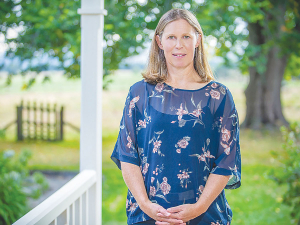Fonterra capital return could boost GDP – ANZ Report
The Fonterra divestment capital return should provide “a tailwind to GDP growth” next year, according to a new ANZ NZ report, but it’s not “manna from heaven” for the economy.
 ANZ agricultural economist Susan Kilsby says high input costs impact more on intensive dairy operations than sheep and beef farms.
ANZ agricultural economist Susan Kilsby says high input costs impact more on intensive dairy operations than sheep and beef farms.
Dairy farmers are taking a ‘more considerate approach’ to their businesses, according to the ANZ bank’s agricultural economist, Susan Kilsby.
She says this is in response to a tightening of profitability on farms with costs such as fertiliser, fuel and labour rising. Susan Kilsby says these factors impact more on intensive dairy operations than sheep and beef farms.
She says for some farmers interest rates have gone up dramatically depending on their overall financial position. Kilsby says in the past few years when times have been good, farmers have paid down debt and these individuals are probably in a better position than otherwise would be the case.
“Farm gate milk prices are still reasonable, but that margin is being squeezed pretty quickly in some cases,” she says.
Kilsby like other commentators in the dairy sector is noticing that farmers are looking closely at their farm businesses and making tweaks to improve their profitability.
She says a lot are exhausted because of the extra work they have had to do during Covid because of labour shortages. She says others are making some changes to their systems by doing such things as milking once a day or three times every two days.
“Definitely some change but nothing dramatic. Some are trying to become a little bit more self-sufficient and therefore not grazing stock out as much as they used to. A few more farms in the Canterbury region are looking at a little more cropping on farm or leasing out paddocks to commercial growers,” she says.
Kilsby says part of this change is in response to labour shortages but also in response to reducing nutrient emission levels.
She says looking at the season to date it will be hard for farmers whose production was down in the spring to pick it up now even though there is very good grass growth in most regions in the North Island.
Susan Kilsby says parts of the South Island are starting to dry out and while it hasn’t reached the stage where farmers are quitting stock there is a bit of a feed pinch.
“The North Island should have pretty good autumn production, but it might be more modest in the South Island,” she says.
New Zealand and Chile have signed a new arrangement designed to boost agricultural cooperation and drive sector success.
New DairyNZ research will help farmers mitigate the impacts of heat stress on herds in high-risk regions of the country.
Budou are being picked now in Bridge Pā, the most intense and exciting time of the year for the Greencollar team – and the harvest of the finest eating grapes is weeks earlier than expected.
The Real Estate Institute of New Zealand (REINZ) has released its latest rural property report, providing a detailed view of New Zealand’s rural real estate market for the 12 months ending December 2025.
Rural retailer Farmlands has released it's latest round of half-year results, labeling it as evidence that its five-year strategy is delivering on financial performance and better value for members.
OPINION: "We are back to where we were a year ago," according to a leading banking analyst in the UK, referring to US president Donald Trump's latest imposition of a global 10% tariff on all exports into the US.
OPINION: Expect the Indian free trade deal to feature strongly in the election campaign.
OPINION: One of the world's largest ice cream makers, Nestlé, is going cold on the viability of making the dessert.